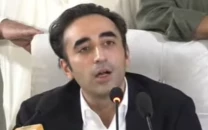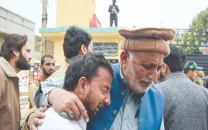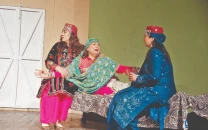'It’s not a woman’s job to see the roads are clean'

“It is not for a woman to see if the streets and roads are clean or if the garbage has been removed,” argued Sajeela Khatoon of the JI. “Women can only play their part in society when the system is fair and when they are respected, rather than forced or treated badly.”
Her comment was not received well. The Pakistan People’s Party’s Shamim Mumtaz Wasi retorted that the women were “part of the system’s policy making”.
This seemed to be the consensus at a seminar on Women Empowerment in Local Bodies organised by the Women Media Centre (WMC) and endorsed by the National Endowment for Democracy (NED). The former local government (LG) system, which gave women 33 per cent of the total number of seats at the union, town and city councils, was one of the best ways of strengthening the role of women and their contribution to society, many felt.
Speakers, however, were in conflict as to whether the LG system that had been implemented for nine years was the best system of governance.
“Women play an important role in strengthening societies and can help develop a stronger system of governance,” WMC executive director Fauzia Shaheen said at the seminar.
Eight hundred and thirty women were given decision-making powers under the former LG system whereas only 20 women were made government representatives under the earlier systems, said former city naib nazim Nasreen Jalil of the Muttahida Qaumi Movement (MQM).
“The [former] system was the best as it created leaders out of the people who were working at grass root levels, said Jalil, adding that the women, especially, who only had 10 per cent representation earlier, were given one-third of the seats under 2001’s LG system.
Jalil, acknowledged, however, that the women were not always successful in matters of governance.
This was because they lacked training and were not qualified to function as effective role models, said Jalil, who was of the belief that women need to be trained so that they can develop self confidence and play their role in society effectively.
LG system’s future
The speakers also deliberated over the future of the LG system. “The PPP and the MQM are talking about the LG system and are expected to arrive at a conclusion soon. There is hope that the LG elections will be held in November,” said Jalil.
The LG monitoring committees should also involve members of the opposition to keep the process transparent. This is something that was lacking in the last government, said Wasi.
PPP’s Saeed Ghani, a former councillor, said that all provinces had earlier voted against the LG system as it was introduced by a dictator without the consent of the provinces. “Why should we bring back the system if the provinces do not want it?” he asked. He added, however, that if the amendments, proposed by the PPP, are implemented, the system can become functional, provided that the people are in favour.
Published in the Express Tribune, June 2nd, 2010.



















COMMENTS
Comments are moderated and generally will be posted if they are on-topic and not abusive.
For more information, please see our Comments FAQ